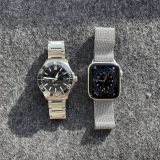Startups comms, essays on tech and five great links each week.
Posts tagged Life
Why Greg Egan is the Greatest Living Sci-Fi Author
Greg Egan explores deeply original concepts like alternate physics and alien civilizations through stories grounded in cutting-edge science, rich characters, and thought-provoking ideas.
How I Stopped Hating Running
Running slower to build endurance and finding a scenic, convenient route helped me fall in love with running. By forming a habit, I've discovered running’s benefits: reduced anxiety, improved fitness, and a meditative escape.
Can Markets Regulate Themselves?
Sometimes, governments regulate markets. And sometimes, market participants regulate themselves. The outcome can be surprisingly different; thankfully, we have several examples that can serve as case studies.
Uber is Good, Actually
A conventional taxi is similar to a tourist-trap restaurant that you will never visit again. Uber leverages technology to become an arbiter between you and the collective of drivers so they can provide a better service.
What Is Elon Musk
I’m a bit tired of how people let their existing opinion on Elon paint their entire image of him yet I myself struggle to define his actions.
You Can Compete By Being Competent
Perfect your execution. This is the part you fully control. It won’t save you when the results aren’t there, but it can help sustain the relationship while you wait for them.
How To Recognize Grifters
Serious people list facts. Grifters list tags that can elevate their social status.
Some Controversial Things I Believe
Just a few things I believe that a lot of people seemingly find controversial.
Your Inner Voice and the Value of Silence
Recently I've been feeling that constantly putting on AirPods and pumping spoken words into my ears might be too much. There's nothing wrong with being bored and enjoying the silence for a bit. But most importantly, it feels like both music and podcasts tune out your inner voice, that intra-cranial conversation people have which generates ideas and inspiration.
Why I Dropped Apple Watch for a Mechanical Watch
I’ve always been into watches and for the last 5 years, since Series 2, I’ve been almost exclusively wearing an Apple Watch. Recently I pulled a trigger on a mechanical timepiece I wanted a long time ago and have been enjoying it since.








